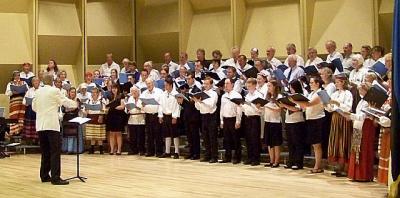25 Sep 2009 A.P.
The recently concluded West Coast Days show that there continues to be a need for gathering of Estonians and their families to rekindle friendships and bathe in a culture familiar to us. Now it is true that the attendance has shrunk over the years, but those who come show an amazing amount of loyalty. In this respect the West Coast gatherings differ from ESTO or Laulupidu in Tallinn. The West Coast Estonian Days (or LEP) draw people who have been attending it perhaps even from its inception. Because of its dependable attendance and predictable and varied menu, it has drawn people also from the other side of the continent and even from overseas.
This year’s LEP was held in Seattle, in Washington State. Such have been held every two years starting in 1953 in San Francisco. The site alternates between the major population centers on the West Coast: Los Angeles, San Francisco, Portland, Seattle and Vancouver, each with perhaps 100 to 200 families with Estonian roots.
This year’s “Days” were well organized. The events were in a compact area, and the attendees had a choice of budget conscious college student level accommodations, to tourist level motels, all within walking distance of all events. The halls for the events were optimally sized by judging that they were all nearly full or totally full. The chairman of the events, Tom Napa, explained that it was quite a challenge to reserve the halls as much as two years in advance, since it was not known how well LEP would be attended given that Laulupidu and ESTO were also held on the same summer.
But Mr. Napa was quite satisfied with the outcome. It exceeded expectations. While the Seattle Estonian community has only about 100 families, Mr. Napa said, a good mix of talents were available for the organizing committee: Malle Hannibal, Ramona Holmes, Mark Muld, Tiina Elken-Muld, Marko Oviir, Tiina Oviir and Paul Raidna in addition many who volunteered for the “foot-work” as needed.
The LEP depend on collaboration between the West Coast Estonian communities for theater, musicians, singers and folk dancers. But help has come also from outside the Estonian community. Under the direction of Lonnie Cline, the Clackamas Community College Choir and its choir veterans have been part of the past five LEP. I recognized one choir member from Taavo Virkhaus’ birthday bash in Tartu in 1999. He said that he is continuing to sing with the choir because “there can never be too much of Veljo Tormis’ songs.”
A noteworthy constant of all LEP that I have attended is the Teose family contribution to folk dance music and dancing. So also at the current Song and Dance Festival. Folk dance clubs from Vancouver, Seattle and Portland performed to the music of a band led by them. The Song and Dance Festival started with combined choirs of the participating cities and the Clackamas Community College. In recalling with Tom Napa that concert, he felt that credit for the high quality of performance must be given the Clackamas singers. The song and dance fest ended with a very enthusiastic Tuljak with both the combined choirs and folk dancers participating under the direction of Taavo Virkhaus, here from Alabama.
From the time Estonia became free, LEP has drawn talent also from Estonia: opera singers, folk dance clubs and choirs. This time the “Kaunimate aastate vennaskond” (‘the brotherhood of best years,’ loosely translated) came from Estonia and provided music and entertainment for many events. They were indispensable, especially for the gala ball. Their participation was made possible by monetary support from the Estonian Government.
Tom Napa said that the organizing committee tried to be sensitive to the fact that many non-English speaking people would be attending the activities and to draw the younger generation might be more comfortable with English. Thus the programs were conducted in good part in English language. This included the church service and concert. In fact the sermon by Archbishop Andres Taul from Toronto was in English.
Tom felt that more should be done to draw younger people, (as was also concluded at the meeting of the Estonian National Committee, held during the LEP). Again the language may be factor. But Tom felt that while the immigrants from the DP camps came here with a mission to keep our culture alive and support the aspiration of freedom for Estonia, the younger folk who now immigrate here are not of the same mindset, or have the same fervor to participate.
The enthusiasm by which the old-timers or the mid-timers met for photo-ops may actually have been intimidating to those who came for the first time, and may have felt as outsiders. The enthusiasm was especially evident at the after-hours-pub singing and on the boat ride to Kiana lodge. The folk fest held at the lodge was unfortunately limited by the boat’s capacity to 350 people. Tom had arranged for us ideal weather (from the standpoint of this Texan), and the grilled salmon was out of this world.
This was the 29th LEP, and judging from the enjoyment of the participants, the tradition must be continued. The organizing committee felt that the interval of two years should be kept so as not to loose momentum. Portland volunteered to host the next LEP in 2011 and it is expected that San Francisco will follow in 2013. No doubt the Portland people are already busy planning the events.
And I am already waiting to sing and dance there again, if they will let me.

